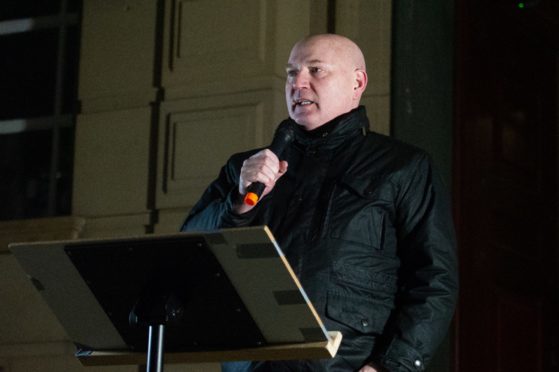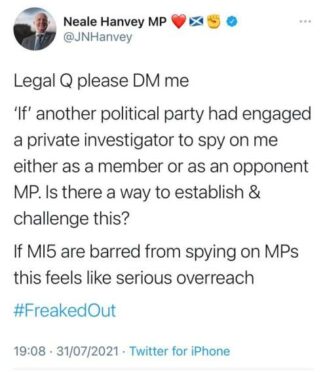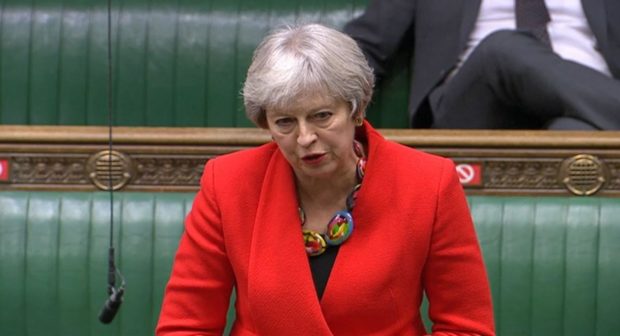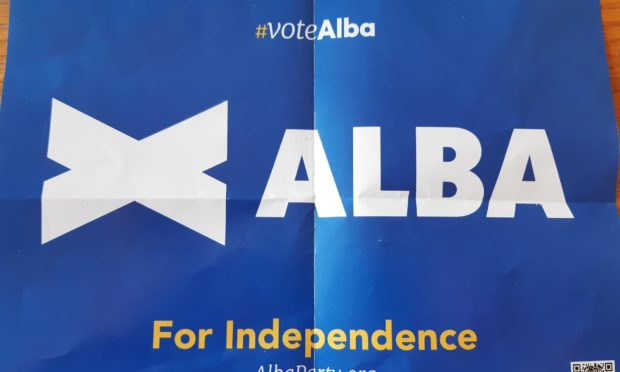A Fife MP has accused another political party of “spying” on him, but doesn’t offer any evidence yet of which party it might be, or what activities he thinks they’re getting up to.
Kirkcaldy and Cowdenbeath Alba representative Neale Hanvey has claimed a private investigator has been “engaged” by “another political party” to snoop on him.
Mr Hanvey, who left the SNP to join Alex Salmond’s newly formed group ahead of the Scottish election earlier this year, would not say who he thought might have placed him under surveillance.
He said he had reported his concerns to the Westminster Parliamentary Security Team and that he would be making “no further comment” at this time.
Accusation
In his Tweet, Mr Hanvey asked his followers to contact him via Twitter’s private messaging system, adding: “If another political party had engaged a private investigator to spy on me, either as a member or opponent MP. Is (sic) there a way to establish and challenge this?
“If MI5 are barred from spying on MPs this feels like serious overreach. #freakedout.”
After being contacted, Mr Hanvey added: “An allegation has been put to me and I am looking for advice.
“I have reported the matter to the Parliamentary Security Team, who have passed on advice how to secure my devices.
“I am not going to make any further statement.”
He further declined to name any would-be private investigator or who would organise such a campaign against him.
A spokesperson for the House of Commons said they could not comment on security matters.
What is the Wilson Doctrine?
Placing politicians under surveillance by state organisations like MI5 and GCHQ is “against convention” according to the “Wilson doctrine”.
The Investigatory Powers Act 2016 placed arrangements on a statutory footing and extended them to members of the devolved administrations including MSPs and MEPs.
It has been in effect since 1966 and is named after former Prime Minster Harold Wilson, who made a statement to the commons after members made a number of questions to the House, concerned their phones had been “bugged”.
Mr Wilson made a statement, promising MPs they were not and would not be, which went on to become the “Doctrine”.
In 2014, following the release of documents in the Edward Snowden leak, then-Home Secretary Theresa May reclarified the Government position, saying “the doctrine did not absolutely exclude the use of surveillance powers against parliamentarians, but it did set certain rules which have to be followed”.
Since the act came into effect in November 2016, clarifying whether in fact the state could “spy” on members, the person doing so on MPs’ communications and interference with their equipment requires the approval of the Secretary of State, a Judicial Commissioner and the Prime Minister.
Swapping SNP for Alba Party
Mr Hanvey left the SNP in March this year, ahead of the Holyrood election and is currently a Member of Parliament for Alba, alongside East Lothian member Kenny MacAskill.
He unsuccessfully stood as a candidate for Alba on the Mid Scotland and Fife regional list.
In May, following the election, he branded his former SNP colleagues “toxic, aggressive and hostile” and he “detested” what the party had become.
He was elected in the snap general election of December 2019 as an independent, having been suspended from the SNP for sharing anti-semitic tropes on social media.
After apologising and receiving training on anti-semitism, he was readmitted to the party, before being sacked from its shadow bench after he backed a crowdfunding campaign for a defamation case against his fellow SNP MP Kirsty Blackman.




